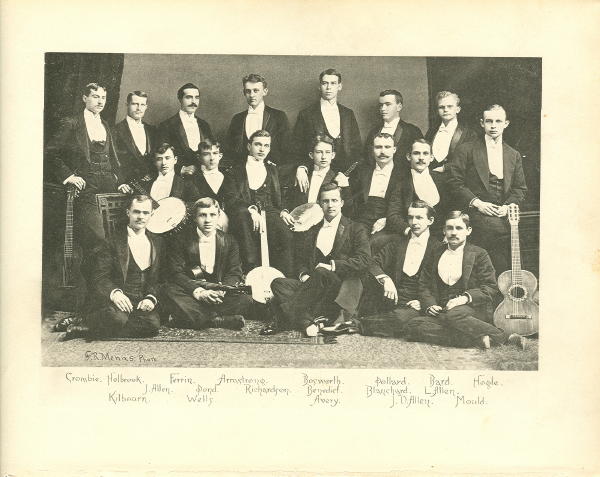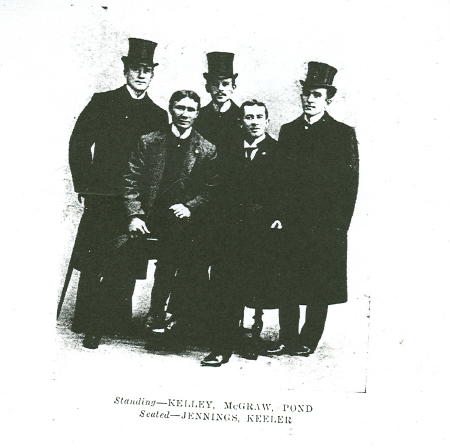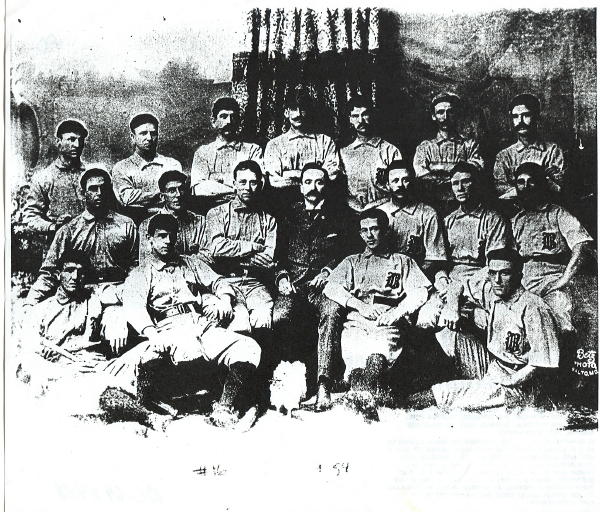(The following was taken from an article summarizing the chase to find what at first seemed unfindable: A story no one apparently knew 'til that night in his nephew's living room.)
Our information on the mysterious Dr. Pond comes from hundreds of hours of research. Scroll to the bottom for the long list of sources we've uncovered, as well as the Pond memorabilia and records we've found in the search
---------------------------------------------------------------------------------------------
"My uncle," he said with a twinkle in his eye, "ended the plague in the Philippines and pitched in major league baseball. Not only that," he continued, "but he was a war hero, too!"
Arlie wasn't given to boasting or exaggeration, so I figured there had to be some basis for his story. I waited for him to tell me more, settling into what I suspected was going to be a long tale. "That's all I know," he said. "Arlie" was my neighbor, Arlington Erasmus Pond; his uncle, also known as "Arlie" was Erasmus Arlington Pond. Though I pressed him for details, eager to keep him talking in this first visit after the death of his wife, he didn't have any other details. In fact, all he knew about Erasmus Arlington Pond had been said in that brief conversation. Was this merely a tall tale from my aging neighbor?
Was it an exaggeration? Not a bit; in fact, what he told me that night turned out to be a dramatic understatement. To find Dr. Pond's history, I first looked in the Baseball Encyclopedia to see if he'd really played baseball. Armed with the news he really had, and a date of his death from the records, I then-----pre-computer and pre-online searches-----search the New York Times database for the three days before and after his death. The obituary not only mentioned his baseball career, military career, and medical career but other details offering shreds of evidence about where else to look for this life well lived.

Lt. Col. Erasmus Arlington Pond was indeed a decorated soldier/surgeon in the Philippines during the Spanish-American War and the Philippine Insurrection that followed. And "Doc Pond", as his Baltimore Orioles teammates called him (the team later sold to someone in the Big Apple and would become the New York Yankees), was friend and physician to baseball's most famous player/manager, and a pitcher on a team with six future Hall of Famers that won three straight years of what would eventually become the World Series, known then as the Templeton Cup. But it was Dr. Pond, District Health Officer in Manila and Cebu, who made the biggest mark on history, staving off the ravages of tropical diseases for a people he once fought against.

Here was an American doctor, fighting an unpopular war half a world away, discovering ways to turn the hatred of former enemies into admiration and even affection. Here was a private citizen surrendering athletic fame for service to a people initially filled with fear and mistrust. And yet years later, banks would close and Filipinos rich and poor would mourn his passing.
Only to forget he ever existed.
This remarkable story of a "Forrest Gumpian" character from turn-of-the-century world events very nearly dipped into oblivion. But for that casual discussion nearly fifteen years ago, the ghostly threads of Dr. Pond's existence might have faded from all memory.
Physical evidence was nearly non-existent. A lonely headstone in the back of an old Vermont cemetery memorializes Erasmus and Elizabeth Pond, but they both died half a world away, their bodies buried in a place only God remembers now. Doc Pond died first, of appendicitis, but his wife died at the hands of the Japanese during World War II, as a prisoner left behind by Gen.MacArthur's retreat.
What started that evening in Arlie's living room set me off on nearly ten years of part-time detective work, the story weaving its way through the National Archives, the Baseball Hall of Fame and Museum, the Rockefeller Foundation, a private military school (Norwich University) and Johns Hopkins University, as well as hundreds of surprise discoveries elsewhere.
Pond's path crossed with U.S Presidents, political and military leaders, both American and Filipino. Men like Teddy Roosevelt, William Howard Taft, Sergio Osmena, Manuel Briones, Senator Redfield Proctor, Leonard Wood, Gen. John Pershing, Dean Worcester, Governor-General Forbes, Victor Heiser, and many others from the pages of history. The same life intersected with baseball's most famous manager, John McGraw, who took his 1912 New York Giants half a world away to play an exhibition against his old teammate and physician. Then there's also Cy Young, Wee Willie Keeler, Wilbert Robinson, three of his teammates who would later be Hall of Famers, and more, from his baseball days.
The results will eventually become a book: "Chasing Ghosts" recounts the discovery of boxes of Pond's military records, thrilling the holder as much as the writer, who had no idea what was there. It talks about the discovery of his uncle's Civil War long-lost, misfiled, military records (himself a volunteer surgeon in the Union Army) and the clues they offer to what motivated the baseball Pond to volunteer for military service. The article also reveals the treasures buried in the Library of Congress that enabled me to piece together the details of the Pond's daily life in the Philippines.
It winds its way through pages of biographies now collecting dust on shelves in libraries around the country, each one holding some small clue to the truth about the disappearing story of Pond's life and work. It opens up questions that remain unanswered even now, like what became of his vast holdings after his death, and why his wife was without means at the start of WWII.
"Chasing Ghosts" also resolves the question of Mrs. Pond's disappearance, a mystery for 60 years, discovered only recently in a poignant, accidental encounter on the Internet with the daughter of the doctor who held her as she passed away. When the Japanese swept MacArthur out of the Philippines in the Second World War, the general of "I-shall-return" fame left many Americans behind, including civilians like Mrs. Pond. Mrs. Pond would be imprisoned in the terrible conditions of the Santo Tomas Concentration facility, and died of starvation after having passed her food to others; and having smuggled food in from the outside and giving it away.
Supporting the article are photographs which can be obtained from the Baseball Hall of Fame, from Norwich University, from my own collection of Pond memorabilia, and from photographs in private collections as well. There is also the possibility of obtaining photographs from sites still in existence in the Philippines, especially Cebu, and of the memorial stone in the cemetery in Vermont.
These include anecdotes about Pond's baseball days, or humorous accounts of his cavalry training without horses and weapons to use, or the drama of the 1912 typhoon which ravaged Cebu and Pond's service there, as well as details of a military expedition for which he was awarded the Silver Star for gallantry.
(NOTE: The SABR baseball biography project chose to make unfortunate conclusions about Dr. Pond based on limited access to accurate information and a terribly offensive word used by Pond while writing from a war zone. Pond was neither a bigot nor an imperialist, as is suggested by the baseball biography article, and drawn from only partial access to Pond's information and the facts of his life.)
Some of our sources:
- Pond's actual military records, covering not only his Spanish-American War service and Philippine Insurrection, but his service in WWI. Also uncovered were the records of his uncle, who also served as a soldier/surgeon for a brief time, but in the Civil War.
- Biographies featuring aspects of Pond's life, including military biographies of the era, baseball biographies of the era (where he's credited with a prominent role in the championship seasons the three years he was with the Orioles) and political biographies of the era.
- Rockefeller Foundation archives
- Records from Norwich University, the University of Vermont, and the University of Maryland, where he attended classes and got his degrees.
- Baseball Hall of Fame and museum, including many photos of Pond as a ballplayer
- Baltimore Orioles records
- English and Filipino daily newspapers from Cebu over the course of the thirty years of his life there, available from the Library of Congress
- Records from the hospitals he founded in the Philippines
- Philippine history accounts of the era, and research assistance provided by universities there in return for sharing elements of his baseball story with them
- Personal correspondence from Dr. Pond
- Period history books from the holding of Cornell University's Southeast Asia collection
- Magazine articles from American popular magazines of the time, including Harper's Monthly, Outlook, Scientific American, among many others
- Newspaper articles from Burlington and Rutland, Vermont, Baltimore, Maryland, and the Cebu and Manila in the Philippine Islands
- Biographical sketches of family members from New England biographical summaries
- Genealogical data on the Pond, Stocker and Gambrill families
- Public records in Massachusetts, Vermont and Maryland
- Baseball diaries and record books from Norwich University and University of Vermont
- Photo archives from the Library of Congress, University of Vermont, Norwich University, Baseball Hall of Fame, published materials and historical library holdings
- Sports newspapers and magazines of the era
- Detailed, specific annual reports filed with the U.S. Government by Pond on the measurable statistics of his work between the periods 1904 and 1914.
- Military reports and correspondence from official military records of the era
- Center for Cebuano Studies at the Univesity of San Carlos, P.I.
- Philippine and U.S. government documents
- Biographies of early Philippine political and business leaders.
- Philippine court records on disposition of his assets following his death.
- Japanese internment camp records from WWII, where Mrs. Pond died
- Business records of companies Pond founded or owned, many of which still operate today.
- Writings of a traveler who visited the Ponds
- The History of the Cebu YMCA



